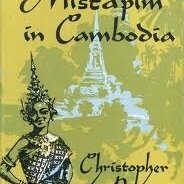Christopher Pym

Christopher Pym (13 Jan 1929, Bristol, UK — 1 Dec 2001, Milton Keynes, Buckinghamshire, UK) was a writer, a researcher on Cambodia’s history and culture, and a local politician challenging the two-party system.
A National Service officer during World War II, he was initially sent to Cambodia by British Intelligence Services in the early 1950s, and developed a special interest in the country’s history and culture. While pursuing his activities in intelligence — he was one of the organizers of the first British Trade Fair in Moscow, and an elected member of the Royal Institute of International Affairs –, he spent 20 months in Cambodia in 1956 – 1957, including a seven-week journey by foot from Binh-Dinh (Vietnam, former capital ot the Champa Kingdom) to Preah Khan and Angkor, walking the supposed 12th-century Royal Road and publishing his travelogue, The Road to Angkor, in 1959.
Following this adventurous journey — during which he encountered tigers and a blocked frontier while ignoring persistant rumors of war –, he published a collection of Cambodian souvenirs in his Mistapim in Cambodia (1960), “Mistapim” being the way Khmer-speaking people addressed “Mister Pym”. Later on, he edited and (copiously) abridged Henri Mouhot’s diary (Henri Mouhot’s Diary: Travels in the central parts of Siam, Cambodia and Laos during the years 1858 – 61, Kuala Lumpur, Oxford University Press, 1966, 160p.). His final work on Cambodia, The Ancient Civilization of Angkor (1968), is still regarded as an inventive take on the history of Cambodia.
An unconventional politician, Pym ran as an independent candidate to the parliamentary elections for the seat of Blyth, Northumberland. He was even briefly arrested for accosting people in the street, asking them to help him fund his election deposit. Elected as Liberal Democrat in Milton Keynes South West in 1983, he remained district councillor for seventeen years.
